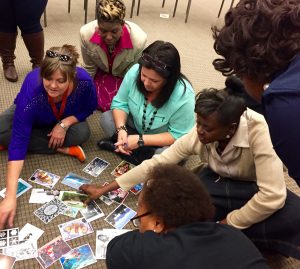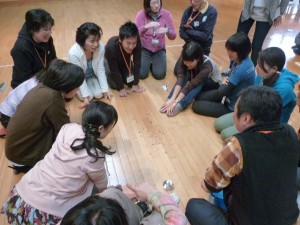Nov 27, 2018 The Language We Use in Facilitation and Teaching: Reflection vs. Debriefing
There’s all the difference in the world between having something to say, and having to say something. —John Dewey
My March of 2013 blog post “The Language We Use in Facilitation: Reflection Vs. Debriefing” explored the importance of the language we use in facilitation. At the time I had been facilitating some workshops for educators in Japan. Working with an interpreter made me cognizant of the jargon in our field and forced me to slow down and carefully think about the words I was using to describe experiential education and the practice of facilitation — specifically reflection vs. debriefing. A recent conversation about this topic in a facilitators forum inspired me to revisit that post.
Reflection is key to creating lasting, meaningful lessons. It can be an engaging part of learning and teaching instead of what is sometimes perceived by learners (and facilitators) as a chore, or boring follow up to an engaging experience. I believe this has to do with the language, timing and presentation of the idea. I encourage facilitators and educators to think about the language they use around reflection, when and how they facilitate it, and their attitudes toward it. Reflection has the potential of being an ongoing, integrated, engaging, and even enjoyable part of learning and teaching that begins the moment a group walks in the door. It can be woven through an experience using a variety of methods, even in the midst of an activity or challenge.
Traditionally, many educators and facilitators use the term debrief to describe this post experience, reflective wrap up. This word originates from the military. It was used by Outward Bound, which was originally based on military programming. I remember talking to my friend and colleague Dave Lockett, about this subject many years ago. Dave, a former Navy S.E.A.L., shared that as a soldier, he didn’t think “debriefing” fit our field as it implied a top-down military report-out to a commanding officer rather than an educational experience. Dictionary definitions affirm Dave’s observation:
debrief, transitive verb • To interrogate (as a pilot) usually upon return (as from a mission) in order to obtain useful information Merriam-Webster Collegiate Dictionary de·briefed, de·brief·ing, de·briefs 1. To question to obtain knowledge or intelligence gathered especially on a military mission. 2. To instruct (a government agent, for example) not to reveal classified or secret information after employment has ceased. American Heritage Dictionary
This word has never resonated for me as an educator for a couple of reasons. It doesn’t sound inviting or engaging; it implies an authoritative approach that is leader-centered and a one-time report out to a superior that seems limited in scope and application. It also implies a static moment in time and strictly limited linear model—activity, followed by a facilitator-directed debrief, followed by an activity, followed by a debrief, and so on.
 I prefer the terms “reflection”, “processing”, or “reflective practice” to describe an on going, engaging, and integrative approach to weaving reflection throughout experiences from beginning to end and beyond, creating stronger connections between learning experiences and real-life outcomes. Ideally, the participant takes more and more ownership and direction in this process as the facilitator/leader/teacher gradually steps into the background. Reflective dialogue should not be a report-out to the leader, but rather an interactive , co-creative discussion or solo self-reflection exercise to help participants find meaning in their experiences and carry the learning forward. Many find that with a more participant-centered approach to facilitating reflection, they gain a wealth of information about their group’s progress and ways they can improve their teaching that were missed when they were taking more control of the process.
I prefer the terms “reflection”, “processing”, or “reflective practice” to describe an on going, engaging, and integrative approach to weaving reflection throughout experiences from beginning to end and beyond, creating stronger connections between learning experiences and real-life outcomes. Ideally, the participant takes more and more ownership and direction in this process as the facilitator/leader/teacher gradually steps into the background. Reflective dialogue should not be a report-out to the leader, but rather an interactive , co-creative discussion or solo self-reflection exercise to help participants find meaning in their experiences and carry the learning forward. Many find that with a more participant-centered approach to facilitating reflection, they gain a wealth of information about their group’s progress and ways they can improve their teaching that were missed when they were taking more control of the process.
Reflection can begin the moment that learners walk in the door (or maybe before with pre-group journaling or questionnaires). Meaningful reflection can and should be woven throughout the entire experience using a variety of methods including metaphoric objects and images, artwork, writing, social interaction, movement, play, as well as dialogue. In this kind of ongoing practice educators work to engage learners in meaningful reflection about their experiences so the lessons can be teased out and applied to other aspects of their lives. The goal is to help the learner to take ownership of and synthesize the information for themselves and their peers. These Inspired Educator Blog posts offer ways to weave reflection throughout experiences to increase relevancy, depth of understanding, and connection to real life and future learning.
For more in-depth ideas see Tips & Tools for the Art of Experiential Group Facilitation:
- Creating Meaning With Metaphor
- Postcard Strengths Reflection
- Strong Beginnings: Find a Hook to Engage Your Groups
- Upcycled Icebreakers for Reflection
References:
Inspired Eductor Blog March 2013
Stanchfield, Jennifer (2014) Inspired Educator, Inspired Learner: Experiential, Brain-Based Activities and Strategies to Engage, Motivate, Build Community and Create Lasting Lessons. Wood N Barnes Publishing Company.
Stanchfield, Jennifer (2016) Tips & Tools for the Art of Experiential Group Facilitation Second Edition. Wood N Barnes Publishing Company.




Michael Cardus
Posted at 23:47h, 04 DecemberThank you for this thoughtful piece. I wonder if even reflection may be too time-bound. Teams may not have sufficient time, or luxury, to have a reflection period. When thinking about learning-while-doing & iterative efforts based upon attractors (what you want to have happen)the reflection may be before – during – and after the action.
I’ve been trying to decrease the use of language that causes a separation from the work. Just calling what we do learning.